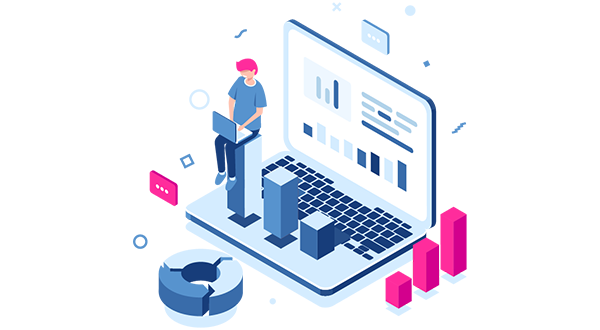

Bridging Skill Gaps in Mainframe Modernization

The mLogica Migration Team
Empowering People for the Digital Era
The Changing Landscape of Mainframe Expertise
Mainframes continue to anchor the world’s most critical industries. In fact, more than 70% of Fortune 500 companies still run their core workloads on mainframes, and 92 of the top 100 global banks rely on them daily to process transactions and manage customer data. Beyond finance, mainframes support 96 of the top 100 retailers and a large majority of healthcare claims processing worldwide.
Despite this enduring relevance, the workforce that supports these platforms is shrinking at an alarming pace. The average COBOL programmer is over 55 years old, and less than 5% of new computer science graduates are trained in legacy languages such as COBOL or PL/I. As seasoned experts retire, they leave behind not only vacant roles but also decades of institutional knowledge that is rarely documented or easily replaced.
mLogica addresses this reality head-on by bridging workforce skill gaps and enabling enterprises to modernize with confidence. Our approach combines proprietary automation, AI-driven insights, and embedded workforce enablement, therefore, ensuring modernization is not only successful but also sustainable.
For organizations, the risk is clear: without proactive skill-building and
modernization strategies, transformation initiatives stall, operational costs rise,
and dependence on expensive external consultants deepens.
Brain Drain in Modernization is the Hidden Risk
The retirement of senior mainframe specialists represents a profound loss of institutional knowledge. These professionals often hold unwritten expertise in business logic, system architecture, and operational troubleshooting that cannot simply be replaced by hiring new staff.
As this “brain drain” accelerates, modernization programs are particularly vulnerable. Mainframe transformation already demands precision, sequencing, and domain expertise. Without in-house specialists to guide the process, organizations face delays, cost overruns, and even failed migrations.
In response, many enterprises lean heavily on consulting firms. While external consultants provide immediate expertise, long-term over-reliance creates significant drawbacks. Enterprises experience spiraling costs, limited internal ownership, and stagnation of innovation. A sustainable strategy must therefore go beyond outsourcing and focus on empowering internal teams with the right training, tools, and processes.
mLogica’s Formula for Success is People, Process, and Platform
At mLogica, we view modernization as a balanced synergy of people, process, and platform. Each is indispensable, and neglecting any one element undermines the transformation effort. This triad forms the cornerstone of our approach, ensuring transformation is holistic, measurable, and future-proof. Unlike many consulting-driven models that emphasize short-term fixes, mLogica’s framework embeds resilience, scalability, and innovation into every stage of the journey.
People
Skilled teams are the foundation of modernization success. Without adequate training and enablement, even the most advanced platforms underdeliver. mLogica prioritizes cross-training and capability-building at every stage of modernization. Our programs ensure that both legacy specialists and new talent are equipped to thrive in hybrid environments that combine mainframe, cloud, and AI-driven systems.
Process
Modernization demands discipline, repeatability, and precision. mLogica’s proprietary frameworks, such as STAR*M for automated legacy database code migration and LIBER*M for application mainframe code refactoring, deliver this rigor. These AI-powered methodologies streamline conversion, detect hidden dependencies, and validate migration accuracy, reducing project timelines by up to 40% compared to traditional approaches.


Platform
The ultimate measure of modernization success is an enterprise’s ability to leverage modern platforms for agility, scalability, and resilience. mLogica works across AWS, Google Cloud, Microsoft Azure, Oracle Cloud, and hybrid environments, ensuring seamless workload migration while optimizing for cost efficiency and future growth.
Based on mLogica client studies, projects typically achieve 30–50% operational
cost reductions within the first 18 months post-migration
Embedding Training Into Modernization
Traditional modernization strategies often treat workforce training as an afterthought. Consultants migrate applications, but internal teams remain unprepared to manage or extend the new environment. The result is underutilized platforms, high dependency on external resources, and wasted investment.
mLogica takes a different approach. We embed training and enablement directly into the modernization journey. From COBOL, Assembler, and IMS applications to AWS Aurora, DynamoDB, and Google Cloud services, we ensure that client teams are not just observers but active participants in the transformation process.
We also leverage low-code and no-code platforms, empowering non-traditional developers and business analysts to extend functionality and create workflows without needing deep programming expertise. This democratization of development reduces bottlenecks, accelerates innovation, and ensures that modernization benefits extend far beyond IT.
AI as the Catalyst for Smarter Modernization
Artificial intelligence has become an indispensable enabler of modernization. At mLogica, we integrate AI across every stage of the process.
- Code Conversion and Refactoring: AI-powered automation accelerates the translation of COBOL, PL/I, and Assembler into modern languages, reducing manual effort and error rates.
- Architectural Dependency Mapping: Advanced algorithms identify hidden interconnections within legacy systems, ensuring smooth sequencing and minimizing migration risks.
- Knowledge Transfer: Natural language processing (NLP) tools convert complex COBOL business rules into accessible modern documentation, making decades of logic understandable to new teams.
- Testing and Validation: AI-driven testing frameworks speed up quality assurance, enabling faster releases without compromising reliability.
These AI-enabled tools, when combined with human expertise, deliver
transformations that are not only faster but up to 35% more cost-efficient than
traditional methods while maintaining higher reliability.
Building Talent Pipelines for the Future
The scarcity of hybrid-skilled professionals; those who understand both mainframe systems and modern cloud-native architectures, is one of the greatest barriers to successful modernization. To overcome this, mLogica invests heavily in developing sustainable talent pipelines.
We begin by recruiting directly from colleges and universities, selecting graduates who bring adaptability, energy, and expertise in modern programming languages. Recognizing that they lack exposure to legacy platforms, we provide intensive training programs that immerse them in COBOL, Assembler, and IMS environments. In parallel, we build their skills in AWS, Azure, and Google Cloud services.
This dual exposure creates a new generation of hybrid professionals, technologists equally fluent in legacy and modern ecosystems. These professionals form the backbone of sustainable modernization, ensuring organizations do not regress into consultant dependency once migration is complete.
Industry Case Studies
These case studies illustrate mLogica’s versatility across industries and our ability to deliver measurable results at scale.
The Path Forward
The coming decade will define modernization success. mLogica is investing in future-ready strategies that address emerging challenges:
- Generative AI for Code Understanding: Generative AI models are accelerating comprehension of legacy code, automating documentation, and bridging knowledge gaps for new developers.
- Predictive Analytics for Operations: By embedding predictive insights into cloud-native platforms, organizations can anticipate demand surges, reduce downtime, and optimize resource allocation.
- Quantum-Ready Architectures: While quantum computing is still maturing, forward-looking enterprises are designing systems with quantum integration in mind. mLogica guides clients in building modular, future-proof architectures ready for next-generation processing power.
Organizations that adopt these innovations today will establish durable competitive advantages tomorrow.
Start Your Modernization Journey
The retirement of mainframe experts is an immediate business risk. Enterprises that act today will secure their future competitiveness; those that wait will face spiraling costs and stagnation. Modernization is more than technology. It is the convergence of culture, capability, and confidence. With mLogica as your partner, your workforce will not only adapt to the digital era but lead it.












































